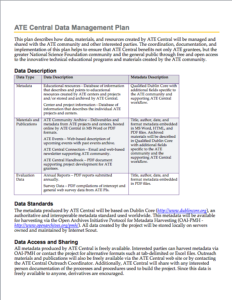
As most ATE community members are aware, the National Science Foundation has, since early 2011, required that all grant applicants provide a one- to two-page supplementary document, known as the Data Management Plan (DMP), to describe how a grantee’s proposal will meet NSF guidelines on the dissemination of grant-funded research. More recently, NSF has added a new requirement to the ATE RFP; namely, newly funded ATE projects and centers are now required to work with ATE Central to archive the valuable deliverables they create. Luckily, these requirements go hand-in-hand, as archiving with ATE Central may very well already be a strategy outlined in your DMP. Even if it isn’t, you may still choose to archive with us as a means to support your project or center goals.
ATE PIs are expected to disseminate all major outcomes of their work produced with NSF funding; they are also asked to make available the data, samples, collections, or support materials created or collected during the course of their work, with some exceptions to confidential information. ATE Central accepts many of these materials for archiving and makes them readily available online. Visitors to the ATE Central website will have access to these materials, even after a project or center’s grant funding has come to an end.
ATE Central may, however, not be the only service you’d like to use to disseminate your work. After all, the more widely you share your materials, the greater the impact they will likely have. There are many avenues to dissemination and preservation, so take some time to explore all those available to you. Here are a few considerations to keep in mind while drafting your DMP:
- The types of data or information that your project or center is likely to generate;
- Where and how your data will be stored until you’re ready to share;
- Conditions that may limit access to your data (e.g. legal or ethical);
- The expectations or norms of your field that govern how you will share your deliverables;
- The options for dissemination available to (or required by) your institution; and
- Whether any other information should be documented (e.g. how data was collected, analyzed, etc.).
While good examples are certainly beneficial in drafting your DMP, keep in mind that each DMP is different; so don’t feel obligated to stick to a particular template. In general terms, the DMP may include the types of content to be produced; any applicable standards used; policies for access and dissemination; policies for re-use, re-distribution, and the creation of derivatives; and plans for archiving data long-term.
Here are a few resources that may be beneficial in drafting your DMP:
- ATE Central Handbook Provides information about the ATE program, partners and collaborators, outreach, managing and sharing deliverables, evaluation, and technology;
- NSF Data Management Plan Requirements Introduces applicants to applicable NSF requirements and documentation; and
- DMPTool Guides researchers through the process of creating a DMP and includes sample plans.
While NSF and the ATE program have already made great strides in ensuring that the deliverables created throughout the community with ATE funding remain accessible long-term, NSF continues to focus its efforts on broadening the impact of the research it funds. This commitment was re-affirmed in March with the release of its public access plan: Today’s Data, Tomorrow’s Discoveries. To be implemented incrementally, the plan first addresses how data and journal publications are, in future, to be made available across NSF programs. Moving forward, NSF expects to expand its scope to include instructional materials, white papers, and more.
We have yet to see how NSF’s public access plan will impact dissemination of deliverables created with ATE funding. However, much like with the implementation of data management planning and now the ATE program’s requirement to archive, it is this librarian’s opinion that greater access to the materials we create can only benefit the ATE community and the educators, students, and other audiences we seek to serve.
If we can answer specific questions about data management planning or if you would like some assistance in preparing to archive with ATE Central, feel free to contact us at info@atecentral.net.

 Subscribe
Subscribe


 See More ATE Impacts
See More ATE Impacts

Comments
There are no comments yet for this entry. Please Log In to post one.